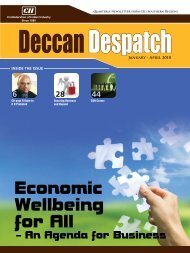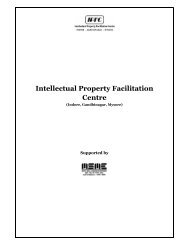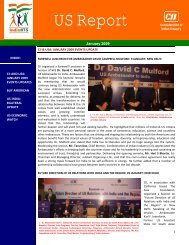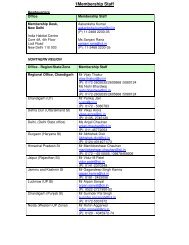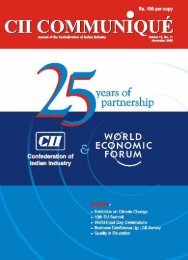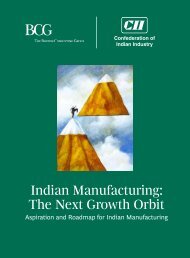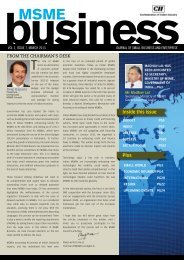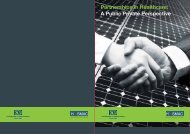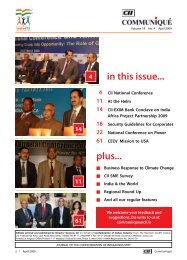CII Communique - February, 2010
CII Communique - February, 2010
CII Communique - February, 2010
You also want an ePaper? Increase the reach of your titles
YUMPU automatically turns print PDFs into web optimized ePapers that Google loves.
cover story<br />
Reign in Fiscal Deficit while Sustaining<br />
Economic Recovery<br />
For the fiscal year 2009-<br />
10, the central government<br />
runs a budgeted fiscal<br />
deficit to the extent of<br />
6.8% of GDP. Adding state<br />
governments’ deficit and<br />
off-budget liabilities, the<br />
consolidated fiscal deficit<br />
crosses the double-digit<br />
mark at 10.2%. A high<br />
fiscal deficit of this magnitude, among other things, would<br />
have the tendency to crowd out private investment, push<br />
up interest rates, discourage FDI inflows, and suffocate<br />
the space for proactive monetary and fiscal policies.<br />
<strong>CII</strong> believes that fiscal deficit during the next financial<br />
year should be brought down to around 5%, without<br />
jeopardizing the process of economic recovery, which<br />
has yet to take a firm footing.<br />
In its pre-budget memorandum, <strong>CII</strong> has provided a<br />
detailed roadmap for reduction in fiscal deficit next year<br />
by augmenting revenues and rationalizing expenditures.<br />
Among the important measures to augment revenues,<br />
<strong>CII</strong> has suggested widening the base of the service tax,<br />
clearing at least a fourth of the over Rs. 2 lakh crores<br />
that is believed to be locked up in various disputes and<br />
litigations, and undertaking disinvestment to the tune<br />
of Rs 40,000 crore. Rationalization of expenditure is<br />
suggested through policy measures such as improving the<br />
efficiency of expenditure on various social programmes,<br />
shifting towards outcome budgeting, creating a third<br />
party monitoring cell to ensure proper utilization of funds<br />
on social programmes, implementation of long-pending<br />
reforms in petroleum prices and subsidies (food and<br />
fertilizer), and increasing capital expenditure.<br />
Rationalize Corporate Taxes<br />
Rationalization of corporate<br />
tax in certain aspects has<br />
the potential to provide a<br />
major thrust to the growth<br />
momentum in investment,<br />
employment and output<br />
in the manufacturing<br />
sector of the economy.<br />
With this in mind, the<br />
<strong>CII</strong> memorandum has<br />
suggested some special fiscal incentives for the entire<br />
manufacturing sector. The fiscal incentive could be in<br />
line with what was offered to select sectors (setting up<br />
and operation of cold chains, warehousing facilities for<br />
storing agriculture produce, and laying and operating<br />
cross-country natural gas or crude or petroleum oil<br />
pipeline networks for distribution on common carrier<br />
principle) of the economy during the announcement of<br />
the previous budget.<br />
Tax incentive is also sought to promote the use of<br />
advanced technology in the manufacturing sector. With<br />
fast growing globalization and competitiveness, technology<br />
is becoming increasingly important for firms to survive.<br />
It is a well-known fact that technology is changing at a<br />
rapid pace and unless we are able to replace assets fast,<br />
we cannot match other countries in terms of productivity<br />
and market share. The objective of penetrating the use<br />
of advance technology in the manufacturing sector to a<br />
large extent can be helped by raising the deprecation<br />
rates on plant and machinery. At present, the depreciation<br />
rate in the case of plant and machinery is only 15%,<br />
which should be raised to 25%.<br />
Scope also exists to rationalize the Minimum Alternative<br />
Tax (MAT) to promote investment in the manufacturing<br />
sector. It may be recalled that MAT was introduced to<br />
counter the rapid increase in the number of zero tax<br />
companies arising out of tax exemption, deduction<br />
and higher depreciation and also widening the tax net.<br />
Zero-tax companies are required to pay MAT at the rate<br />
of 15%. While there may be some merit for imposition<br />
of MAT, it is at the heavy cost of diluting the various<br />
tax incentives that are offered to revitalize industry. <strong>CII</strong><br />
has, therefore, recommended reduction in MAT rates<br />
substantially.<br />
Another key recommendation pertaining to corporate<br />
taxes relates to the amendments in tax laws that are<br />
made with retrospective effect. This has happened<br />
in numerous instances, apparently to neutralize the<br />
decisions of the appellate authorities, namely ITAT, or<br />
High Court, which were in favor of the assessee. Such<br />
instances usually result in harassment of the assessee<br />
at the hands the assessing officer, besides violating the<br />
principles of equity, justice and fair play in payment<br />
of taxation. The recommendation is therefore to avoid<br />
introducing amendments with retrospective effect.<br />
Encourage Research &<br />
Development<br />
In an increasingly competitive and<br />
dynamic milieu, R&D expenses<br />
determine the lifeline of a business.<br />
The Indian manufacturing sector<br />
has, however, not been able to<br />
spend the desired amount on R&D.<br />
Communiqué <strong>February</strong> <strong>2010</strong> | 7



